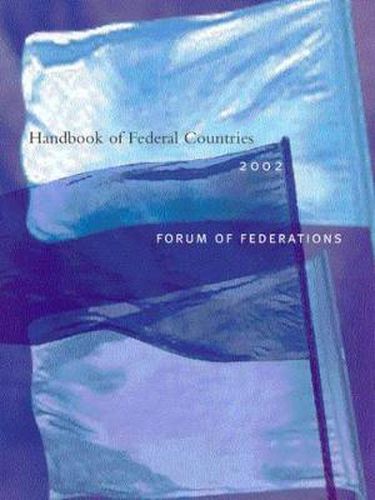Readings Newsletter
Become a Readings Member to make your shopping experience even easier.
Sign in or sign up for free!
You’re not far away from qualifying for FREE standard shipping within Australia
You’ve qualified for FREE standard shipping within Australia
The cart is loading…






For more than two centuries federalism has provided an example of how people can live together even as they maintain their diversity. While the implosion of the former Yugoslavia illustrates that federalism is not, and cannot be, a panacea, its abiding success in other countries shows that it is a system worth examining. The Handbook of Federal Countries, 2002 , a project of the Forum of Federations, an international network that seeks to strengthen democratic governance by promoting dialogue on and understanding of the values, practices, principles, and possibilities of federalism, does exactly this, incorporating available information about existing federations in one place for easy, convenient reference. The Handbook of Federal Countries, 2002 includes articles on the 21 countries that classify themselves as federations as well as four whose systems incorporate sufficient elements of federalism that it is useful to include them. These articles - written by authors around the world - examine the development, institutions, constitutions, and dynamics of federalism and include tables containing current political/geographic and economic/social information. The Handbook also includes four comparative papers, each of which examines a theme of concern to federal countries: foreign policy in an era of globalization that increasingly encroaches on the jurisdiction of constituent units and demands their active participation; use of federalism to accommodate minorities; distribution of resources and power (fiscal federalism); and issues relating to regional autonomy and federalism in a European context.
$9.00 standard shipping within Australia
FREE standard shipping within Australia for orders over $100.00
Express & International shipping calculated at checkout
For more than two centuries federalism has provided an example of how people can live together even as they maintain their diversity. While the implosion of the former Yugoslavia illustrates that federalism is not, and cannot be, a panacea, its abiding success in other countries shows that it is a system worth examining. The Handbook of Federal Countries, 2002 , a project of the Forum of Federations, an international network that seeks to strengthen democratic governance by promoting dialogue on and understanding of the values, practices, principles, and possibilities of federalism, does exactly this, incorporating available information about existing federations in one place for easy, convenient reference. The Handbook of Federal Countries, 2002 includes articles on the 21 countries that classify themselves as federations as well as four whose systems incorporate sufficient elements of federalism that it is useful to include them. These articles - written by authors around the world - examine the development, institutions, constitutions, and dynamics of federalism and include tables containing current political/geographic and economic/social information. The Handbook also includes four comparative papers, each of which examines a theme of concern to federal countries: foreign policy in an era of globalization that increasingly encroaches on the jurisdiction of constituent units and demands their active participation; use of federalism to accommodate minorities; distribution of resources and power (fiscal federalism); and issues relating to regional autonomy and federalism in a European context.